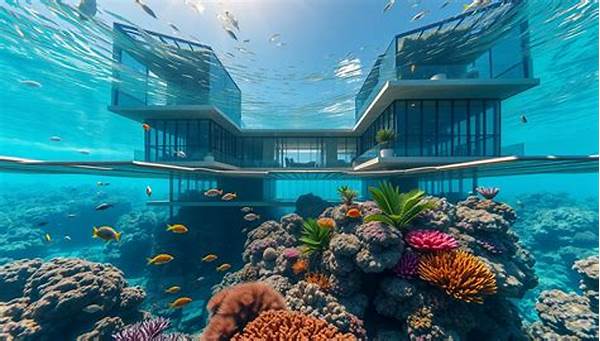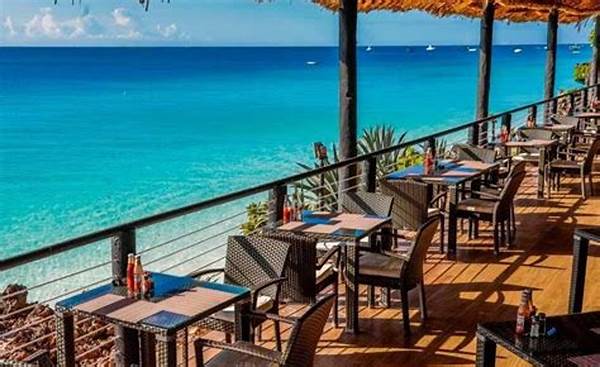Hey fellow eco-enthusiasts! If you’ve ever dreamed of enjoying a tropical paradise without harming its breathtaking underwater beauty, you’re in the right spot. Today, we’re diving into the essential coral reef-friendly resort development guidelines. These guidelines are crucial if we’re to strike a balance between tourism and conservation. So, grab a coconut drink, sit back, and let’s explore!
Read Now : Country Family Vacation Spots
Embracing Sustainability in Resort Development
When we talk about coral reef-friendly resort development guidelines, it’s all about sustainability. Picture this: a stunning beachfront resort that doesn’t just coexist with nature but actively contributes to its preservation. The only footprints you leave are in the sand, not in the ecosystem. In an age where eco-consciousness is more than just a trend, it’s a responsibility. These guidelines are the lifeboat we need to navigate the turbulent waters of environmental conservation.
Committing to eco-friendly practices isn’t always an easy journey. It requires developers to carefully plan and design resorts with minimal impact on coral reefs, which are as fragile as they are beautiful. The guidelines encourage using sustainable materials, managing waste efficiently, and integrating renewable energy sources. Not only do these measures protect marine life, but they also offer guests an authentic experience of nature’s wonders.
Furthermore, coral reef-friendly resort development guidelines promote community involvement. It’s essential for resorts to work closely with local communities, respecting their culture and traditions while providing economic opportunities. This collaborative approach not only ensures sustainable development but also enriches the experiences for visitors, offering a true taste of the region’s heart and soul.
Key Considerations for Resort Developers
1. Site Selection: Choosing a location that does not disrupt existing marine ecosystems is vital. The guidelines help developers assess potential impacts on nearby coral reefs.
2. Design Principles: Implement designs that blend naturally with the landscape. Use native plants and materials to support local biodiversity and enhance the overall eco-friendly appeal.
3. Energy Usage: Incorporate renewable energy solutions like solar or wind power to reduce the carbon footprint. Efficient energy use is a cornerstone of coral reef-friendly resort development guidelines.
4. Waste Management: Implement strategies that minimize waste production and ensure that any waste is disposed of responsibly. Composting and recycling are key components.
5. Water Conservation: Integrate systems that reduce water waste, such as rainwater harvesting and effective wastewater treatment, to protect nearby coral habitats.
Benefits of Following the Guidelines
By sticking to coral reef-friendly resort development guidelines, resorts can significantly reduce their environmental footprint. This adherence not only protects delicate marine ecosystems but also bolsters the resort’s reputation as an eco-friendly destination. Inarguably, guests are increasingly choosing stays that reflect their values, meaning these efforts don’t just preserve the environment—they boost business, too.
Guests who visit resorts committed to these guidelines often have the opportunity to partake in unique eco-friendly tours and activities. These experiences promote environmental awareness and instill a deeper appreciation for coral reefs. Plus, a natural, sustainable setting allows visitors to reconnect with nature, often leading to a more enriching vacation experience.
Moreover, adapting these guidelines strengthens community ties. Resorts can become partners in sustainable development, offering employment opportunities and respecting local traditions. This kind of symbiotic relationship fosters a positive impact on the area’s social fabric, strengthening both the community and the resort’s standing within it.
Steps to Develop Coral Reef-Friendly Resorts
1. Environmental Assessment: Conduct thorough studies to understand the ecological characteristics of the site.
2. Partnerships: Collaborate with environmental organizations to implement effective conservation strategies.
3. Guest Education: Create programs to educate guests about coral reef conservation and how they can help.
Read Now : Waterpark Holiday Offers For Families
4. Regular Monitoring: Continuously evaluate the effects of resort activities on local ecosystems and adjust practices accordingly.
5. Eco-friendly Activities: Offer activities that have minimal impact on the environment, like snorkeling excursions led by marine biologists.
6. Local Material Sourcing: Use locally sourced and sustainable building materials to support the community and ecosystem.
7. Cultural Sensitivity: Ensure development respects the local culture and incorporates traditional designs and practices.
8. Wildlife Protection: Implement measures to protect local flora and fauna during and after the development.
9. Green Certifications: Pursue certifications that recognize eco-friendly practices, boosting credibility.
10. Feedback Mechanism: Enable a system for guests and locals to provide feedback on the resort’s sustainability efforts.
Challenges and Solutions
Developing a resort with a focus on coral reef-friendly guidelines can be challenging but rewarding. The initial investment in sustainable technology and practices might be higher, but the long-term benefits outweigh the costs. Resorts must navigate regulatory requirements, potential higher construction expenses, and sometimes even skepticism from stakeholders.
To mitigate these challenges, resort developers can start by engaging with specialists early in the planning process. Building partnerships with environmental experts and non-profits ensures a flow of knowledge and resources. Long-term success depends on continuous learning and adaptation, remaining flexible to emerging sustainable practices and new technologies.
Ultimately, the goal is to create spaces where tourists can enjoy natural beauty while preserving it for future generations. By overcoming these hurdles and adhering to coral reef-friendly resort development guidelines, resorts can achieve a harmonious blend of luxury and responsibility.
Conclusion
Wrapping up, let’s remember that coral reef-friendly resort development guidelines aren’t just rules on a page. They’re a call to action, an invitation to tread softly and act wisely in our search for paradise. These guidelines allow us to enjoy the wonders of coral reefs while ensuring their preservation for future explorers.
So, whether you’re a developer contemplating the next big resort, or a traveler choosing your next getaway, think about the impact. Making conscious choices today crafts a legacy of sustainability. After all, éco-consciousness is a journey, not a destination, and we’re all in it together. With these guidelines, we can protect our planet’s blue treasures, one resort at a time.



